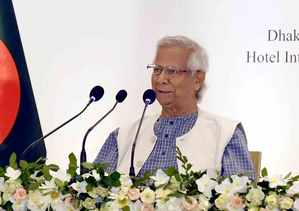International
Bharat's security prowess unsettles West-centric global security dynamics
New Delhi, May 28 (IANS) Over the past year, India has found itself at the epicentre of Western allegations, coupled with old friend camaraderie with Pakistani generals accusing Indian officials of undermining the sovereignties of nations by purportedly engaging in the termination of terrorists in Canada, the US, and Pakistan.
This intimidating interest in alleged Indian clandestine security operations, raises pivotal questions about the underlying motives and the broader global dynamics at play. Concurrently, it signals India’s ascendance in the realm of global security as a revitalised and influential force, unsettling the traditional West-centric world order.
In an era where the global threat landscape is increasingly complex, global and interconnected, India’s extraordinary criminal justice measures to neutralise terrorists over the past decade – such as the September 29, 2016 surgical strike on terror launchpads across the Line of Control in Pakistan-occupied Kashmir, and the 2019 airstrike on the Jaish-e-Mohammed training camp in Balakot, Pakistan – are particularly significant.
Under the leadership of Prime Minister Narendra Modi, these operations had shed the “outdated and reluctant” image of Indian security agencies of the past, showcasing new India’s capability and resolve. The operations were conducted with a notable degree of professionalism, responsibility and transparency, as the Indian PM informed his Pakistani counterpart before disclosing them to the world. These actions not only announced Bharat’s arrival as a formidable security force, but also challenged the traditional West-centric world order.
Recent Western allegations, devoid of substantive evidence as seen in opinion-heavy reporting of ‘The Guardian’ claiming India’s role in tens of terrorist terminations in Pakistan, a covert unseen Five Eyes network intelligence report regarding the killing of Canadian terrorist Hardeep Singh Nijjar and subsequent local vote-bank influence as evidenced in Canada, along with the case involving the alleged attempted assassination of Gurpatwant Singh Pannun, the US-based face of the proscribed terrorist entity Sikhs For Justice (SFJ), appear to be part of a broader strategy aimed at exerting collective pressure and undermining India’s assertive stance against terrorism.
India which has long been a victim of cross-border terrorism orchestrated by Pakistan and its extensive global terror network, which includes Canadian and American terrorists.
Canadian terrorists like Talwinder Singh Parmar of Babbar Khalsa masterminded the 1985 bombing of Air India Flight 182, claiming 329 innocent lives.
Similarly, American terrorists like David Coleman Headley and his Canadian accomplice Tahawwur Rana played pivotal roles in the dastardly 2008 Mumbai attacks by Lashkar-e-Taiba, resulting in 175 deaths and over 300 injuries.
More recent attacks, such as the 2016 Uri assault by Pakistan-backed Jaish-e-Mohammed, which killed 19 Indian soldiers and injured 30, and the 2019 Pulwama suicide bombing by Jaish-e-Mohammed and Lashkar-e-Taiba, which took the lives of over 40 Indian police personnel, underscore the persistent threat India faces.
In this context, India’s measures acknowledged criminal justice measures like those listed above to protect itself are not only moral and lawful but also a national security imperative. However, the coordinated Western and Pakistani allegations involving unravelings like Nijjar’s assassination in Canada, an attempted assassination of Pannun, and tens of terrorist killings in Pakistan appear more fixed on challenging the newfound capabilities of India’s security apparatus under Prime Minister Modi. This stance appears discordant with traditional security superpowers that often perceive national security as their exclusive domain.
Most importantly, India’s strategic partnerships with various nations, including those in the West, are built on mutual respect and shared interests. These alliances are grounded in a mutual commitment to promoting global stability, economic development, and security. However, for these relationships to thrive and be truly effective, they must be free from unwarranted accusations and intimidation that can undermine trust and cooperation.
Unsubstantiated allegations and politicised narratives not only strain diplomatic ties but also detract from the collaborative efforts needed to combat terrorism effectively.
By fostering an environment of mutual trust and respect, Western nations and India can work together to dismantle terrorist networks, prevent radicalisation and enhance global security.
In conclusion, it is imperative that Western nations avoid actions that could be perceived as coercive or dismissive of India’s security concerns. Instead, they should prioritize engagement that is based on equality, respect, and a shared commitment to eradicating terrorism. By doing so, they not only reinforce their alliances with India but also bolster the collective ability to address and overcome the multifaceted challenges posed by terrorism in the 21st century. It is time for the international community to support India’s efforts to create a secure and stable world, acknowledging that a strong and secure Bharat is beneficial for global peace and prosperity.
(The author is the research director of Delhi based think-tank, Centre for Integrated and Holistic Studies)
–IANS
pawa/svn
International
Laos seeks to enhance nutrition amid climate change concerns

Vientiane (Laos), Aug 22 (IANS) Representatives from the Lao government and development partners have attended a conference here titled “Climate Change and Nutrition in Laos: Intersections and Interventions” to discuss the impact of climate change on nutrition in the Southeast Asia country and potential solutions.
Speaking at the conference, deputy director general of the Department of Hygiene and Health Promotion under the Lao Ministry of Health Viengkhan Phixay, said, “We gather to address a critical and interwoven issue: the impact of climate change on nutrition and how we can work together to tackle these challenges,” Xinhua news agency reported.
The Lao government is actively engaged in this endeavor, with numerous policies and initiatives aimed at addressing both climate change and nutrition, Lao National Television reported on Thursday.
“By leveraging the Scaling Up Nutrition network in Laos, which is led by the government, and supported by civil society, donors, and the United Nations, we have a robust platform to tackle the negative impacts of climate change while improving nutrition and overall health for everyone in Laos,” Viengkham said at the conference held on Monday.
The conference featured a series of presentations that not only detailed evidence-based research but also introduced innovative tools for measuring and enhancing nutrition under the impact of climate change.
The conference stressed the critical need for integrated approaches to tackle the intertwined challenges of climate change and nutrition, and setting the stage for impactful future collaborations.
–IANS
int/psd
International
One killed, seven injured in shootout in Iraq

Baghdad, Aug 22 (IANS) A civilian was killed while seven others were injured on Thursday in a tribal shootout in Iraq’s holy Shiite province of Najaf, according to a local security source.
The shootout erupted in the early hours between armed men from the local tribe in the al-Zarga area in northern Najaf, some 160 km south of Baghdad, a local police officer told Xinhua on condition of anonymity.
The clash resulted in the killing of an Iraqi civilian and the injury of seven others, including three Iranian Shiite pilgrims, the source added.
A joint force from the Interior Ministry’s emergency response division and Najaf provincial police arrested 53 gunmen from both sides of the shootout and seized weapons and ammunition, the Interior Ministry said in a statement.
It added that search operations are ongoing to locate additional gunmen and weapons, with more details to be released later.
The incident took place as numerous pilgrims traveled to the city of Karbala to observe Arbaeen, which marks the end of a 40-day mourning period for the killing of Imam Hussein, the grandson of Prophet Muhammad, in the Battle of Karbala in 680 A.D.
Typically, these pilgrims also visit Najaf as part of their journey to Karbala.
–IANS
int/jk/arm
International
Bangladesh seeks $1 billion budget support from World Bank

Dhaka, Aug 22 (IANS) Bangladesh’s interim government has sought $1 billion from the World Bank as budgetary support.
The call came from the country’s Power, Energy and Mineral Resources Adviser Muhammad Fouzul Kabir Khan’s meeting with Abdoulaye Seck, the World Bank’s Country Director for Bangladesh and Bhutan, in Dhaka on Wednesday.
He made the plea as the ministry owes more than 2 billion dollars to suppliers in import costs of power and energy, Xinhua news agency reported.
Khan mentioned that the interim government, which was formed with many pressing mandates, is due to settle a $2 billion debt left by the previous government in the power sector.
He said they have already suspended activities under the much-criticized Quick Enhancement of Electricity and Energy Supply Act 2010 and abolished the government’s power to set energy prices without any public hearing.
On August 5, the former Prime Minister of Bangladesh, Sheikh Hasina, was ousted from her country and power, ending her rule since January 2009.
This event was seen as a massive escalation, with what initially started as student’s protests and resulted in a major crisis in Bangladesh.
Earlier on August 8, Nobel laureate Muhammad Yunus took oath as the head of Bangladesh’s interim government.
–IANS
int/jk/as
International
Search for missing migrants underway after boat capsizes in Serbia: Ministry
Belgrade, Aug 22 (IANS) Serbian police are still searching for seven missing migrants in the Drina River after their boat capsized when crossing from Serbia to Bosnia and Herzegovina, Serbia’s Interior Ministry confirmed in a press release issued on Thursday.
According to testimonies of the migrants who managed to reach the shore, there were approximately 25 people on board. So far, police and rescue teams have found 18 individuals, including three children, on the riverbank, Xinhua news agency reported.
Serbian Deputy Prime Minister and Minister of the Interior Ivica Dacic said police and the Emergency Situations Sector responded promptly after being alerted by the Bosnian border authorities early Thursday morning.
An intensive search is underway in the Drina River and its surrounding area.
The European Border and Coast Guard Agency, Frontex, reported a significant decrease in illegal border crossings in the Western Balkans during the first half of 2024.
The illegal crossings towards EU borders reached 12,407 between January and July 2024, a 75 per cent drop compared to the same period last year.
–IANS
int/jk/as
International
Islamabad sealed with containers amid threats of religious and political protests

Islamabad, Aug 22 (IANS) Islamabad, the capital of Pakistan, turned into a fortress on Thursday with dozens of containers forcing closure of several roads with heavy deployment of law enforcement forces following the cancellation of a No-Objection Certificate (NOC) of an anti-government protest planned by Pakistan Tehreek-e-Insaf (PTI) and protest call by religious parties, including the Jamaat-e-Islami (JI), Jamiat Ulema-e-Islam (JUI) under the banner of Majlis-e-Tahaffuz-e-Khatme Nabuwwat against a Supreme Court decision in the Mubarak Sani case.
Anticipating widespread protests, the local administration, which had cancelled the NOC, imposed Section 144 in the city, barring assembly of people and also closed all educational institutions for the day.
Later in the day, the PTI announced its decision to postpone its protest rally and rescheduled it for September 8.
The government maintained that it did not want to take any chance considering the Supreme Court hearing and also the presence of Bangladeshi cricket team in the country which is currently touring Pakistan for a Test series.
On Wednesday, the capital administration of Islamabad decided to cancel the NOC for PTI, less than 24 hours before the scheduled public gathering in Tarnol area. PTI had earlier announced that it would go ahead with its planned gathering even after its NOC was revoked.
“It is concerning that the government might try to exploit the rally to incite unrest and blame it on PTI. They are scared and are trying to find ways to orchestrate cases against us,” said senior PTI leader Azam Swati.
Imran Khan’s party has been struggling to hold a political gathering in the capital for the past five months with the local administration delaying grant of any permission to hold such an event. Even after a permission is granted, it ends up being revoked a few hours later.
The latest episode is the second time the capital administration has cancelled the NOC issued to PTI for holding a political gathering at Tarnol.
The government maintains that it had detailed meeting with the Inspector General Police, Deputy Commissioner, senior officers from the Chief Commissioner’s office, officials of the Inter-Services Intelligence (ISI), Military Intelligence (MI) and Intelligence Bureau (IB) after which it was decided that there will be serious law and order concerns if the gathering is allowed.
On the other hand, several religious parties have also taken to the streets in Islamabad, protesting against the Supreme Court of Pakistan’s verdict in the Mubarak Sani case.
Tehreek-e-Khatam-e-Nabuwat, an umbrella name for different religious parties, has called for a protest in front of the Supreme Court after the July 24 Supreme Court verdict in the case, maintaining and ruling that while Ahmadis are declared non-Muslims, they retain the right to profess and proliferate their religion, provided they do not publicly use Muslim terms or introduce themselves as Muslims.
In February 2024, Mubarak Ahmed Sani, an Ahmadi, was accused of violating the Punjab Holy Quran (Printing and Recording) Amendment) Act 2021 by distributing the proscribed book ‘Tafseer-e-Sagheer’. However, the Supreme Court maintained that the alleged act occurred in 2019, before it was criminalised in 2021.
The Supreme Court decision was widely criticized by the religious groups who demanded the federal and the Punjab government to challenge the decision and ensure punishment for Sani.
The Punjab government later filed a review petition in the Supreme Court while a petition was also filed by the Federal government on directions of the Prime Minister Shehbaz Sharif.
–IANS
hamza/as/
-
Video1 year ago
PM Modi Attacks Congress in Karnataka with “Kerala Story”
-
Cricket1 year ago
CSK players rejoice 5th IPL title with their families (Pics)
-
Politics1 year ago
Siddaramaiah & DK Shivakumar sworn in as Chief Minister & Deputy CM respectively
-
Entertainment1 year ago
Karan Deol weds his longtime Girlfriend Drisha Acharya (Pics)
-
Entertainment1 year ago
Urvashi Rautela dazzles on Cannes 2023 red carpet (Pics)
-
Entertainment1 year ago
Sunny Leone gets ready for Kennedy premiere in Cannes (Pics)
-
Sports6 years ago
History Of Official FIFA WORLD CUP Match balls
-
Entertainment1 year ago
Alia Bhatt looks crazy beautiful in Prabal Gurung creation at MET GALA 2023 (Pics)






























